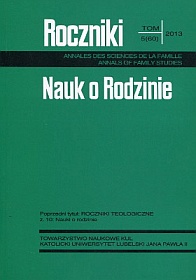The Attitudes of Slovak Catholics towards Marriage and Family and its Implications
Abstract
In our cultural framework marriage means a monogamous, lifelong partnership of two persons of different sex, which is open for parenthood. Since mid twentieth century asignificant change of cultural mentality can be seen in Europe, which brings with itself also a changed understanding of marriage and family. In the first place it is manifested in expecting the fulfilment of one's personal life and the realization of individual personal happiness to which belongs mostly the emotional fulfilment. Other dimensions such as giving life, help in good times and in bad, mutual fidelity, have become rather marginal. We can see the change in a decreasing number of marriages and increasing number of non-marital communities, cohabitations, and in the effort to legalize and equalize homosexual partnerships with classic marriages. In additon to this there is a tendency to live an independent life (singles) which excludes permanency of common life. Moreover, there is a growing number of single mothers raising their children and a large number of divorced mothers with children. Besides, one can notice a decline in the willingness to have a child as well as in the decline of their number, which consequently results in a demographic crisis. This phenomenon conserns also the Slovak Catholics. The research in the field of reproductive behaviour and the research of religiosity carried out by the team of prof. Jozef Matulník show that the marriage value index is low even among the Slovak Catholics. In Slovakia this crises of marriage has become a challenge for the Catholic Church. Thus in this contribution we will try to outline some possible solutions of this problematic.

